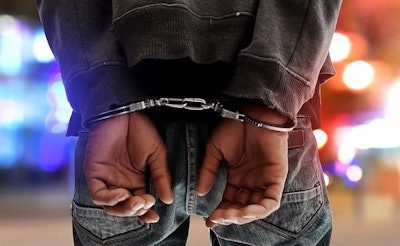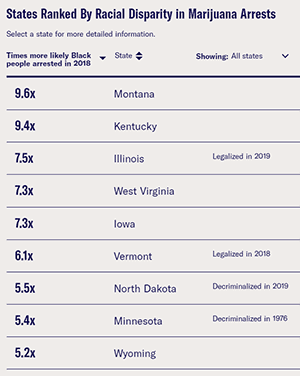
Cannabis arrests persist, even in this age of reform, according to a new report published by the American Civil Liberties Union (ACLU). The report, titled “A Tale of Two Countries: Racially Targeted Arrests in the Era of Marijuana Reform,” highlights the unsettling disparities among who is being targeted by law enforcement in recent years.
From the top, the ACLU notes that cannabis arrests are down overall in states that have legalized or decriminalized cannabis. (Even in states where cannabis is legal, certain amounts in possession and illicit sales are still illegal.) But in states where cannabis remains illegal (17 states as of early 2020), cannabis arrests have actually increased from 2010 to 2018.
 aclu states
aclu statesIn certain states that have legalized or decriminalized cannabis, racial disparities in arrests continue.
The ACLU report is a clarion call for legalization on a broad scale, similar in spirit to the vision behind the Marijuana Justice Act. That congressional bill, which has been sidelined in the Senate Judiciary Committee for more than a year, contains a very clear social equity and criminal justice reform element.
When U.S. Sen. Cory Booker introduced that bill back in 2017, he said: “Our country’s drug laws are badly broken and need to be fixed. They don’t make our communities any safer—instead, they divert critical resources from fighting violent crimes, tear families apart, unfairly impact low-income communities and communities of color and waste billions in taxpayer dollars each year.”
The recent ACLU data articulates that idea with stunning clarity.
“Racial profiling among law enforcement is directly to blame for these disparities,” according to the ACLU. “Police often target people (for stop and frisk, search, and arrest) based on their actual or perceived race rather than reasonable suspicion of criminal activity. Minor offenses — including marijuana possession — are aggressively enforced in communities of color while these same offenses are rarely enforced in more affluent, predominantly white communities. The result is the disproportionate arrest and incarceration of people of color, and particularly young people of color, who can wind up entangled in the criminal legal system with lifelong implications because of a minor offense.”
Drilling down to the county level in its report, the ACLU shows how unevenly cannabis arrests are dished out in the U.S. Black residents are far more likely to be arrested for cannabis than their white neighbors. The raw numbers may vary state to state, but the baseline ratio that separates black and white U.S. citizens in this case is generally consistent.
“Racial disparities vary in severity across states,” according to the report. “Colorado has the lowest disparity, at 1.5, while in Montana, Kentucky, Illinois, West Virginia, and Iowa, Black people were more than seven times more likely to be arrested for marijuana than white people. However, one commonality among all states— legalized, decriminalized, illegal — is that Black people are still significantly more likely to be arrested for marijuana than white people. And at the county level, there are places where Black people are more than 20, 30, 40, or even 50 times more likely to be arrested than white people.”
Illinois stands out as a notable example. The state, with its population hovering around TK, decriminalized cannabis in 2016 and legalized cannabis in 2019. Today, adult-use retail storefronts are open across the state—and expanding. Illinois recorded about $75 million in legal cannabis sales in January and February alone.
And yet, according to the ACLU data, black citizens are 7.5x more likely to be arrested for cannabis than white citizens. In Cook County, where Chicago is located, that number jumps to 10x greater likelihood.



























